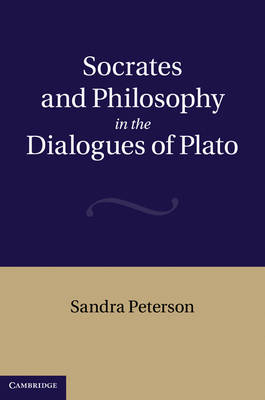
Socrates and Philosophy in the Dialogues of Plato
Seiten
2011
Cambridge University Press (Verlag)
978-0-521-19061-9 (ISBN)
Cambridge University Press (Verlag)
978-0-521-19061-9 (ISBN)
Through the close reading of passages in the Theaetetus, Republic and Phaedo, Sandra Peterson presents a theory regarding the contrasting portrayals of Socrates in Plato's dialogues, arguing that there is a single Socrates whose conception and practice of philosophy remain the same throughout the dialogues.
In Plato's Apology, Socrates says he spent his life examining and questioning people on how best to live, while avowing that he himself knows nothing important. Elsewhere, however, for example in Plato's Republic, Plato's Socrates presents radical and grandiose theses. In this book Sandra Peterson offers a hypothesis which explains the puzzle of Socrates' two contrasting manners. She argues that the apparently confident doctrinal Socrates is in fact conducting the first step of an examination: by eliciting his interlocutors' reactions, his apparently doctrinal lectures reveal what his interlocutors believe is the best way to live. She tests her hypothesis by close reading of passages in the Theaetetus, Republic and Phaedo. Her provocative conclusion, that there is a single Socrates whose conception and practice of philosophy remain the same throughout the dialogues, will be of interest to a wide range of readers in ancient philosophy and classics.
In Plato's Apology, Socrates says he spent his life examining and questioning people on how best to live, while avowing that he himself knows nothing important. Elsewhere, however, for example in Plato's Republic, Plato's Socrates presents radical and grandiose theses. In this book Sandra Peterson offers a hypothesis which explains the puzzle of Socrates' two contrasting manners. She argues that the apparently confident doctrinal Socrates is in fact conducting the first step of an examination: by eliciting his interlocutors' reactions, his apparently doctrinal lectures reveal what his interlocutors believe is the best way to live. She tests her hypothesis by close reading of passages in the Theaetetus, Republic and Phaedo. Her provocative conclusion, that there is a single Socrates whose conception and practice of philosophy remain the same throughout the dialogues, will be of interest to a wide range of readers in ancient philosophy and classics.
Sandra Peterson is Professor of Philosophy at the University of Minnesota, Twin Cities.
Acknowledgments; 1. Opposed hypotheses about Plato's dialogues; 2. Socrates in the Apology; 3. Socrates in the digression of the Theaetetus: extraction by declaration; 4. Socrates in the Republic, part I: speech and counter-speech; 5. Socrates in the Republic, part II: philosophers, forms, Glaucon and Adeimantus; 6. Socrates in the Phaedo: another persuasion assignment; 7. Others' conceptions of philosophy in Euthydemus, Lovers, and Sophist; 8. Socrates and Plato in Plato's dialogues; 9. Socrates and philosophy; Bibliography.
| Erscheint lt. Verlag | 10.3.2011 |
|---|---|
| Verlagsort | Cambridge |
| Sprache | englisch |
| Maße | 160 x 235 mm |
| Gewicht | 620 g |
| Themenwelt | Geschichte ► Allgemeine Geschichte ► Vor- und Frühgeschichte |
| Geisteswissenschaften ► Philosophie ► Philosophie Altertum / Antike | |
| Geisteswissenschaften ► Sprach- / Literaturwissenschaft ► Anglistik / Amerikanistik | |
| Geisteswissenschaften ► Sprach- / Literaturwissenschaft ► Literaturwissenschaft | |
| ISBN-10 | 0-521-19061-4 / 0521190614 |
| ISBN-13 | 978-0-521-19061-9 / 9780521190619 |
| Zustand | Neuware |
| Informationen gemäß Produktsicherheitsverordnung (GPSR) | |
| Haben Sie eine Frage zum Produkt? |
Mehr entdecken
aus dem Bereich
aus dem Bereich
Was Pompeji über uns erzählt
Buch | Hardcover (2023)
Propyläen (Verlag)
CHF 44,75
auf den Spuren der frühen Zivilisationen
Buch | Hardcover (2023)
C.H.Beck (Verlag)
CHF 27,95


